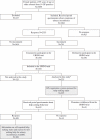Systematic screening for urinary incontinence in older women: who could benefit from it?
- PMID: 22324458
- PMCID: PMC3337522
- DOI: 10.3109/02813432.2011.628244
Systematic screening for urinary incontinence in older women: who could benefit from it?
Abstract
Objective: To identify women who are suffering from urinary incontinence but do not consult a physician and to identify reasons for this.
Design: Survey study as part of a randomized controlled trial that investigates the effects of a standardized assessment and evidence-based treatment on urinary incontinence in older women, the URINO project.
Setting: Female patients from general practices in the Northern part of the Netherlands.
Patients: A total of 225 women of 55 years and older suffering from urinary incontinence.
Main outcome measures: Number of patients with urinary incontinence who are not registered by their GP as suffering from this, factors associated with help-seeking behaviour, and reasons for not seeking help.
Results: Of the 225 patients, 143 (64%) were not registered by their GP as suffering from urinary incontinence. These women were more often younger and had lower levels of distress due to their urogynaecological symptoms. The most common reason for not consulting a GP was that patients considered their symptoms not to be serious enough.
Conclusion: The prevalence of older women with urinary incontinence who do not seek help is high. Help-seeking behaviour is associated with increasing age and higher levels of distress caused by the symptoms. Younger patients more often hesitate to consult their GP if they perceive their symptoms to be relatively mild.
Figures
Comment in
-
Re: Systematic screening for urinary incontinence in older women: who could benefit from it?J Urol. 2013 Jan;189(1):226. doi: 10.1016/j.juro.2012.09.135. Epub 2012 Nov 20. J Urol. 2013. PMID: 23235234 No abstract available.
References
-
- Anger JT, Saigal CS, Litwin MS. The prevalence of urinary incontinence among community dwelling adult women: Results from the National Health and Nutrition Examination Survey. J Urol. 2006;175:601–4. - PubMed
-
- Ko Y, Lin SJ, Salmon JW, Bron MS. The impact of urinary incontinence on quality of life of the elderly. Am J Manag Care. 2005;11:S103–S111. - PubMed
-
- Lagro–Janssen T, Smits A, Van Weel C. Urinary incontinence in women and the effects on their lives. Scand J Prim Health Care. 1992;10:211–16. - PubMed
-
- Teunissen D, Van den Bosch W, Van Weel C, Lagro-Jansen T. “It can always happen”: The impact of urinary incontinence on elderly men and women. Scand J Prim Health Care. 2006;24:166–73. - PubMed
-
- Fonda D, Woodward M, D'Astoli M, Chin WF. Sustained improvement of subjective quality of life in older community-dwelling people after treatment of urinary incontinence. Age Ageing. 1995;24:283–86. - PubMed
Publication types
MeSH terms
LinkOut - more resources
Full Text Sources
Medical

